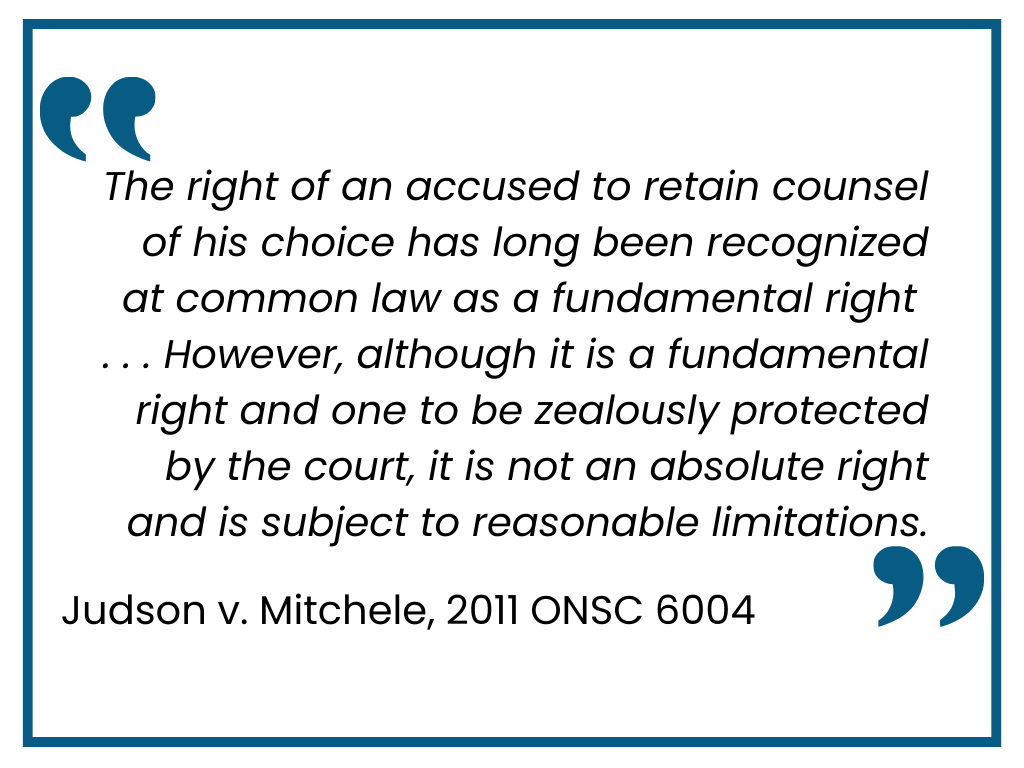
The question of whether a lawyer can represent their family members is answered by looking at the law societies’ rules and common law

There are times when a client may ask, can a lawyer represent family members in court or advise them on legal matters they’re facing? In these situations, the saying that “blood is thicker than water” can hound lawyers and force them to take on their relative’s case. However, it’s not that simple. There are ethical and legal factors to consider when a lawyer and their client are related or when their relationship can result in a conflict of interest.
Lawyers can represent family members in cases. However, there are qualifications based on ethics and what the codes of professional conduct by law societies provide. This will also depend on the type of case being dealt with by the family member.
People should be allowed to choose their counsel, including family members, says author and lawyer Philip Slayton. For instance, a mother who is a lawyer may want to act for her children. “It may not be wise to have the mother represent the son, but I don’t think it should be stopped unless there are egregious reasons for the court to interfere,” said Slayton.
“These days, it’s hard enough to get before the courts with adequate representation,” said Slayton. “There are also many consequences to not having adequate representation, like a person ultimately representing themselves when they are unable to find representation, which is neither good for the person or the judge in most cases.”
There’s no hard rule that prohibits a lawyer from representing their family members or relatives in court. However, as we’ll later discuss in this article, there are guidelines according to law that lawyers must consider when representing family members.
An initial question that must be answered is how does a lawyer-client relationship start? Watch this video to find out:
Looking for alternative lawyers because the lawyer in your family cannot represent you? Check out Canadian Lawyer’s Special Reports on the Top Law Firms in Ontario.
The main rules that will cover the dealings of lawyers and their clients who are related to them — by blood or in any other capacity — are the lawyers’ codes of professional conduct.
In Ontario, that would be the Law Society of Ontario (LSO) and their Rules of Professional Conduct (the LSO’s Rules). The Rules is patterned after the Model Code of Professional Conduct issued by the Federation of Law Societies of Canada, as amended by the LSO over time.
In addition to the Rules are the common law principles that equally apply to similar, future cases. Most of the time, it further interprets the provisions of the Rules to guide lawyers when they’re confronted in parallel situations.
One of the highlights of the LSO’ Rules is the lawyers’ duty to avoid conflict of interest which they owe to their clients; this applies even if their client is a family member. Because the relationship between lawyers and clients is highly personal and privileged, any conflict of interest between them will affect their professional dealings with each other.
The codes of conduct define conflict of interest as the risk that will affect a lawyer’s loyalty to their client. This conflict may arise due to any of the following:
This duty to avoid conflict of interest is related to the lawyers’ other duties to their clients, such as:
Commentaries of LSO’s Rules provide that a lawyer who advises or represents a family member can be an example of a conflict of interest. To guide lawyers in determining if there’s conflict of interest in a matter they’re handling, they can look at two factors:
For an example of how conflicts of interest happen, watch this video:
Check out our Practice Management page if you’re a lawyer who wants more resources about tips on effectively managing their own legal practice or their firm’s operations.
When a lawyer has determined that there is, or even a possibility of, a conflict of interest, it’s their duty to inform the client of this potential conflict. This rule applies not only in cases when the client is a family member, but also in instances when a conflict of interest might be present.
It’s understandable that when a person is faced with a legal problem, the first person they’ll approach is the lawyer in their family. This is not entirely prohibited by the LSO’s Rules, but there are some restrictions to follow.
The Rules further outline how lawyers should make their legal services available to the public, including their family members. One of the restrictions according to the Rules is that lawyers must not take advantage of vulnerable persons or those who have suffered a traumatic experience.
The Rule’s commentaries provide that lawyers are still allowed to assist these people, including close relatives and personal friends, if:
Just as with any other law society, the LSO’s compensation fund releases grants to those who have suffered losses because of the dishonesty of their lawyer. To become eligible for this fund, the LSO has certain guidelines that the client must meet.
One of the instances when a client cannot recover from the compensation fund is when the client is the family of the lawyer who caused the loss. Examples of this is when the client is a lawyer’s:
Over the years, common law has been replete with cases which lawyers can use to measure whether there’s conflict of interest when representing a family member. These cases are also great examples of when a lawyer can take up the case of their family member.
An important case law about lawyers representing their family is the Ontario Superior Court decision of Judson v. Mitchele, 2011 ONSC 6004. The subject of this appeal is the interlocutory order banning a mother from representing her son in family court.
The matter first arose in the divorce proceedings between Susan Judson and Richard Mitchele. Mitchele’s mother, lawyer Rosemary Lavalley, was representing him. Whether Lavalley could represent Mitchele in the pair’s continuing family court matters arose before Justice Heather McGee, who issued the interlocutory order. McGee ultimately determined Lavalley couldn’t act for her son due to conflicts of interest.
It then proceeded to Superior Court Justice Cary Boswell upon Mitchele’s application for leave to appeal. In granting the leave to appeal, the ruling reiterated a longstanding principle that “the right of a litigant to be represented by counsel of his or her choice is a fundamental principle which should only be infringed in clear cases.”
“As I indicated, a disqualification order requires the court to consider and balance competing interests,” wrote Boswell. “On the one hand, the right to retain counsel of one’s own choice. On the other, considerations about the administration of justice.
In this case, Boswell held that “McGee was unable, on the ex parte motion, to conduct the balancing exercise because there was no evidence filed or submissions made on behalf of the respondent.”
To add, Boswell rejected the idea that a family relationship was akin to romantic involvement between a lawyer and a client. The issue wasn’t, in his view, grounds for disqualification. “The suggestion that a romantic relationship between lawyer and client inevitably gives rise to a conflict of interest is inconsistent with the conflict-of-interest provisions of the [Law Society of Upper Canada’s] Rules of Professional Conduct.”
“The proposed appeal raises issues of procedural fairness that transcend the interests of the litigants in this case,” Boswell explained to end the decision. “Moreover, a limitation on counsel representing family members is a matter that extends well beyond the boundaries of this particular case and is, in my view, of general public interest.”

The argument about access to justice doesn’t negate the reality that it’s often difficult for family members to separate feelings from fact in heated family court debates, says Simon Chester. He now works as a counsel at Gowling WLG (Canada) LLP.
In most cases, lawyers don’t represent people they’re intimately involved with for a variety of reasons, including the fact that they may end up serving as witnesses. “It’s probably not a good idea if objectivity will become an issue, which is certainly often the case in heated family matters where it may be difficult to separate feelings from the duties required of a lawyer,” Chester said.
It's not a good idea to represent a close relative. “Doctors don’t treat their own family members, and lawyers would be ill advised to believe they can do the same,” said Chester. “As a lawyer, you’re not simply a mouthpiece for your client, you’re an official of court... Objectivity becomes an important factor.”
There are instances when it's better for the lawyer to inhibit themselves from representing their family members, such as:
This is based on maintaining fairness for both parties. This ensures that the lawyer has full loyalty to their client, and that the client will have the best legal representation possible.
So, what now are the alternatives when a lawyer cannot (or will not) represent their family members? Here are two suggestions for lawyers and family members who are at a crossroads regarding this matter:
The lawyer who cannot represent their family member can refer them to a colleague. Referral policies of firms may also work out well in these situations (e.g., reduced billing rate for referrals).
LSO’s Rules also say that conflict of interest doesn’t apply to the firm. This allows a lawyer to refer their client to another lawyer within the same firm, given that the family member-lawyer would not be involved in their family member’s case.
When handling a family member’s case is unavoidable, a lawyer must still follow the same standards and rules as when handling any client. For example, have formal discussions in the office rather than at a family event, and have a signed retainer agreement. It's important that client intake processes are still followed.
Lawyers can represent their family, close friends, and other relatives. However, both the lawyer and their client must be aware of possible problems, such as conflicts of interest, that may arise during the legal process.
While blood ties may be strong in other instances, it isn’t appropriate to justify legal engagement, especially in certain cases. For these situations, looking back at the law societies’ rules and common law is important.
More resources on law societies’ rules, which answer the question of whether a lawyer can represent their family, can be found on our Professional Regulation page.